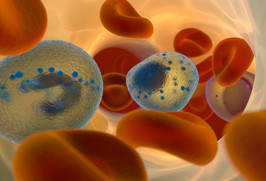The totality of evidence approach for biosimilars in the European Union (EU) was discussed in a review paper [1] using case studies to illustrate biosimilars for which differences were observed in different parts of the comparability exercise and the justification for why these differences did not preclude regulatory approval.
Clinical data requirements for biosimilars in the EU: immunogenicity comparability
Biosimilars/Research
|
Posted 08/11/2019
 0
Post your comment
0
Post your comment

For biosimilars, the regulatory review process is based on the totality of evidence generated in support of biosimilarity. The biosimilar clinical programme aims to demonstrate that the proposed biosimilar is similar to the originator biological based on analytical assessments, and that it does not have clinically meaningful differences from the originator biological, based on comparative clinical studies.
Immunogenicity comparability
Infliximab
In the case of an infliximab biosimilar, the primary efficacy analysis of the comparative phase III study in patients with rheumatoid arthritis (RA) demonstrated equivalent American College of Rheumatology 20% response rates (ACR20) at Week 30 with biosimilar and reference product. However, anti-drug antibody (ADA) rates measured with a highly sensitive assay were about 5%–12% higher in the biosimilar cohort at the individual time points of determination.
Although there was some disagreement in EMA’s Committee for Medicinal Products for Human Use (CHMP), the majority view was that the numerical differences in ADA rates had no meaningful impact on any of the efficacy parameters analysed, as the primary endpoints fell within the predefined comparability margins. Additional data also showed that a similar percentage of patients in both treatment arms required increased doses of study drug irrespective of ADA status, which provided further evidence that ADAs did not have a relevant impact on efficacy.
From an analytical, functional and pharmacokinetic (PK) perspective, convincing similarity of the biosimilar and the reference product was shown, further supporting the conclusion of biosimilarity and leading to approval.
Etanercept
In the case of an etanercept biosimilar, analytical, functional and PK data supported biosimilarity. In addition, a pivotal efficacy study in patients with RA provided robust evidence of equivalent efficacy between the biosimilar and the reference product. However, in terms of immunogenicity, there was a significant difference in overall ADA formation at Week 24 (3 biosimilar patients positive versus 39 in reference group).
The clinical impact of the difference in ADAs seemed negligible and the difference largely vanished after 8 weeks of treatment. In addition, the applied electrochemiluminescence assay suffered from a low drug tolerance, rendering the finding of reduced ADA incidence with the biosimilar uncertain.
Although the ADA data suggested reduced immunogenicity of the biosimilar, this would not preclude a conclusion of biosimilarity.
Disclaimer
The authors of the research paper [1] declared that the views and opinions expressed in the paper are the personal views of the authors and may not be understood or quoted as being made on behalf of or reflecting the position of the regulatory agencies with which the authors are affiliated.
Conflict of interest
The authors of the research paper [1] declared that there was no conflict of interest.
Editor’s comment
If you are interested in contributing a research article in a similar area to the GaBI Journal, please send us your submission here.
Related articles
Clinical data requirements for biosimilars in the EU: efficacy comparability
Clinical data requirements for biosimilars in the EU: PK and PD comparability
Clinical data requirements for biosimilars in the EU: analytical comparability
Clinical data requirements for biosimilars in the EU
Biosimilars applications reviewed in the EU
Reference
1. Wolff-Holz E, Tiitso K, Vleminckx C, Weise M. Evolution of the EU Biosimilar Framework: past and future. BioDrugs. 2019 Sep 20. doi: 10.1007/s40259-019-00377-y. [Epub ahead of print]
Permission granted to reproduce for personal and non-commercial use only. All other reproduction, copy or reprinting of all or part of any ‘Content’ found on this website is strictly prohibited without the prior consent of the publisher. Contact the publisher to obtain permission before redistributing.
Copyright – Unless otherwise stated all contents of this website are © 2019 Pro Pharma Communications International. All Rights Reserved.
News
FDA approves Poherdy (first interchangeable pertuzumab) and Armlupeg (pegfilgrastim) biosimilars
EMA recommends approval for insulin glargine biosimilar Ondibta and denosumab biosimilar Osqay
General
Samsung Bioepis wins Pyzchiva case; Regeneron patent rulings threaten foreign biosimilars
Chinese biosimilars go global: growth, partnerships, and challenges
What is the future for the US biosimilar interchangeability designation

Biosimilars/Research Posted 05/06/2025
Biosimilar clinical efficacy studies: are they still necessary?

Biosimilars/Research Posted 27/05/2025
The best selling biotechnology drugs of 2008: the next biosimilars targets








Post your comment